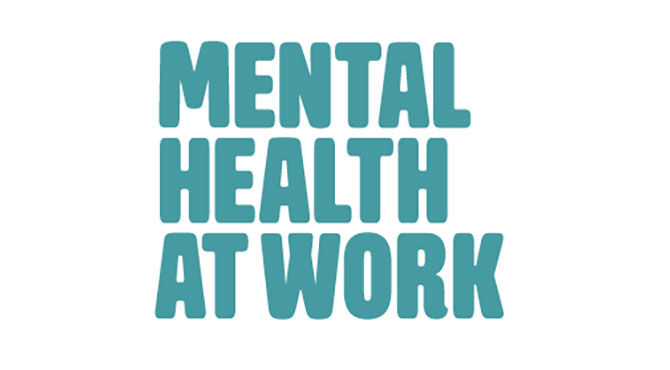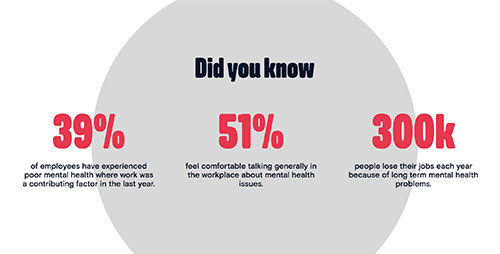The Mental Health at Work Commitment
UK businesses and organisations, mental health charities and NGOs urge employers of all sizes to join the movement and improve standards of mental health care among the workforce at a national scale.

What specifically is the Mental Health at Work Commitment?
The Mental Health At Work Commitment is made up of six standards, which draw on best practicefrom the Thriving at Work review, as well as other pledges and charters available. It brings everything
together in one place.
- Prioritise mental health in the workplace by developing and delivering a systematic programme of activity
- Proactively ensure work design and organisational culture drive positive mental health outcomes
- Promote an open culture around mental health
- Increase organisational confidence and capability
- Provide mental health tools and support
- Increase transparency and accountability through internal and external reporting
Mental Health at Work YouGov survey: results
The recent Mental Health at Work YouGov survey conducted for Business in the Community (BITC) and Mercer Marsh Benefits shows only one in two (51%) of respondents say they feel comfortable talking about mental health in the workplace, and two in five (39%) say they have experienced a work-related mental health issue in the last year. While many employers have been acknowledging and responding to growing demands, dedicating significant resource to tackling the issue, it was leading to a scattergun approach, with duplication and often confusion. The Commitment seeks to end that confusion promoting and sharing best practice that can be activated among employers at all levels.
Read more about mental health and wellbeing:
- How to support employee wellbeing
- Managers, how comfortable are you with discussing your employees’ mental health?
- Mental health in children
What are the "Thriving at Work" standards?
- Produce, implement and communicate a mental health at work plan
- Develop mental health awareness among employees
- Encourage open conversations about mental health and the support available when employees
- are struggling
- Provide employees with good working conditions and ensure they have a healthy work life
- balance and opportunities for development
- Promote effective people management through line managers and supervisors
- Routinely monitor employee mental health and wellbeing
- Enhanced standards
- Increase transparency and accountability through internal and external reporting
- Demonstrate accountability
- Improve the disclosure process
- Ensure provision of tailored in-house mental health support and signposting to clinical help
Mental Health at Work Commitment: what do UK business leaders say?
Sir Ian Cheshire, Chairman of Barclays UK
Sir Ian Cheshire, Chairman of the Thriving at Work Leadership Council and Chairman of Barclays UK, said “There are no quick fixes, or simple solutions when it comes to mental health. Yet there’s no ignoring the fact that work is often a contributory factor for people whose mental health is suffering. As employers, there are lots of things we can do that can make a difference to how our employees feel at work. The six standards we are setting out today are based on, what best practice has shown, is needed to make a difference. They have been developed with mental health charities, leading employers and trade organisations. If every employer in the country signed up, we could have a meaningful impact on millions of employees across the UK.”Paul Farmer, CEO of Mind
Paul Farmer, CEO of Mind and co-author of the Thriving at Work review, said “It’s great to see so many employers take proactive steps towards creating mentally healthy workplaces by engaging with The Mental Health at Work Commitment. With issues like stress, anxiety and depression common across all employers, regardless of size or sector, we want to see every employer recognise and address any workrelated causes of poor mental health among their staff. The Commitment comes with resources available to help employers prevent poor mental health and promote wellbeing. Smart, responsible employers recognise that staff who feel valued and supported tend to be more productive and are less likely to take time off sick or leave the organisation.”David Oldfield of Lloyds Banking Group
David Oldfield, Chair of the Wellbeing Leadership Team, Business in the Community and Group Director, Commercial Banking, Lloyds Banking Group, said “The research showing how people are feeling in the workplace should be concerning for all of us. With 1 in 4 people experiencing a mental health problem in any given year, it’s likely that many of our colleagues may be struggling, and we have a responsibility to take action. We would encourage all businesses to challenge themselves on what more they can do to protect and support the health and wellbeing of their colleagues. This Commitment provides a framework to do this, supported by a one stop shop of resources. The more employers of all sizes who sign up and take action, the more of a real difference we can make."Dame Carolyn Fairbairn, Confederation of British Industry Director-General
Dame Carolyn Fairbairn DBE, CBI Director-General, said: “Everyone at some point in their lives will be affected by poor mental health, perhaps through personal experience or someone they care about. Companies perform better when their staff are happier, healthier and more engaged. Many firms are taking practical steps to help their people thrive and support their emotional wellbeing. But more must be done urgently and firms are rising to the challenge. The Mental Health at WorkCommitment matters because it supports business leaders to make mental health a boardroom priority. It is this leadership that will help tackle the taboo around mental health, encourage people to feel comfortable talking about their emotions and seek practical support if and when they need it.”
Which companies support the Mental Health at Work Commitment (as of launch date)?
- The Businesses Signed at Launch (listed alphabetically):
- Anglian Water
- Barclays
- Bupa UK
- Business in the Community
- CIPD
- Confederation of British Industry
- Deloitte
- Department for Digital, Culture, Media and Sport
- E.ON UK
- Edelman UK
- Historic England
- Institute of Directors
- John Lewis Partnership
- Lloyds Banking Group
- Mace
- Matrix Chambers
- Medivet
- Mental Health Foundation
- Mercer
- Mind
- National Grid
- Nuffield Health
- Procter & Gamble
- Roots Human Resources Community Interest Company
- Royal Mail
- Santander UK
- Society of Occupational Medicine
- Thrive Bristol
- Unilever UK & Ireland
- Virgin Money
For more information, visit our dedicated Health and Wellness section.
Subscribe to Relocate Extra, our monthly newsletter, to get all the latest international assignments and global mobility news.Relocate’s Global Mobility Toolkit provides free information, practical advice and support for HR, global mobility managers and global teams operating overseas.
 /directory?utm_source=website&utm_medium=text&utm_campaign=dir" target="_blank">Access hundreds of global services and suppliers in our Online Directory
/directory?utm_source=website&utm_medium=text&utm_campaign=dir" target="_blank">Access hundreds of global services and suppliers in our Online Directory
©2024 Re:locate magazine, published by Profile Locations, Spray Hill, Hastings Road, Lamberhurst, Kent TN3 8JB. All rights reserved. This publication (or any part thereof) may not be reproduced in any form without the prior written permission of Profile Locations. Profile Locations accepts no liability for the accuracy of the contents or any opinions expressed herein.























